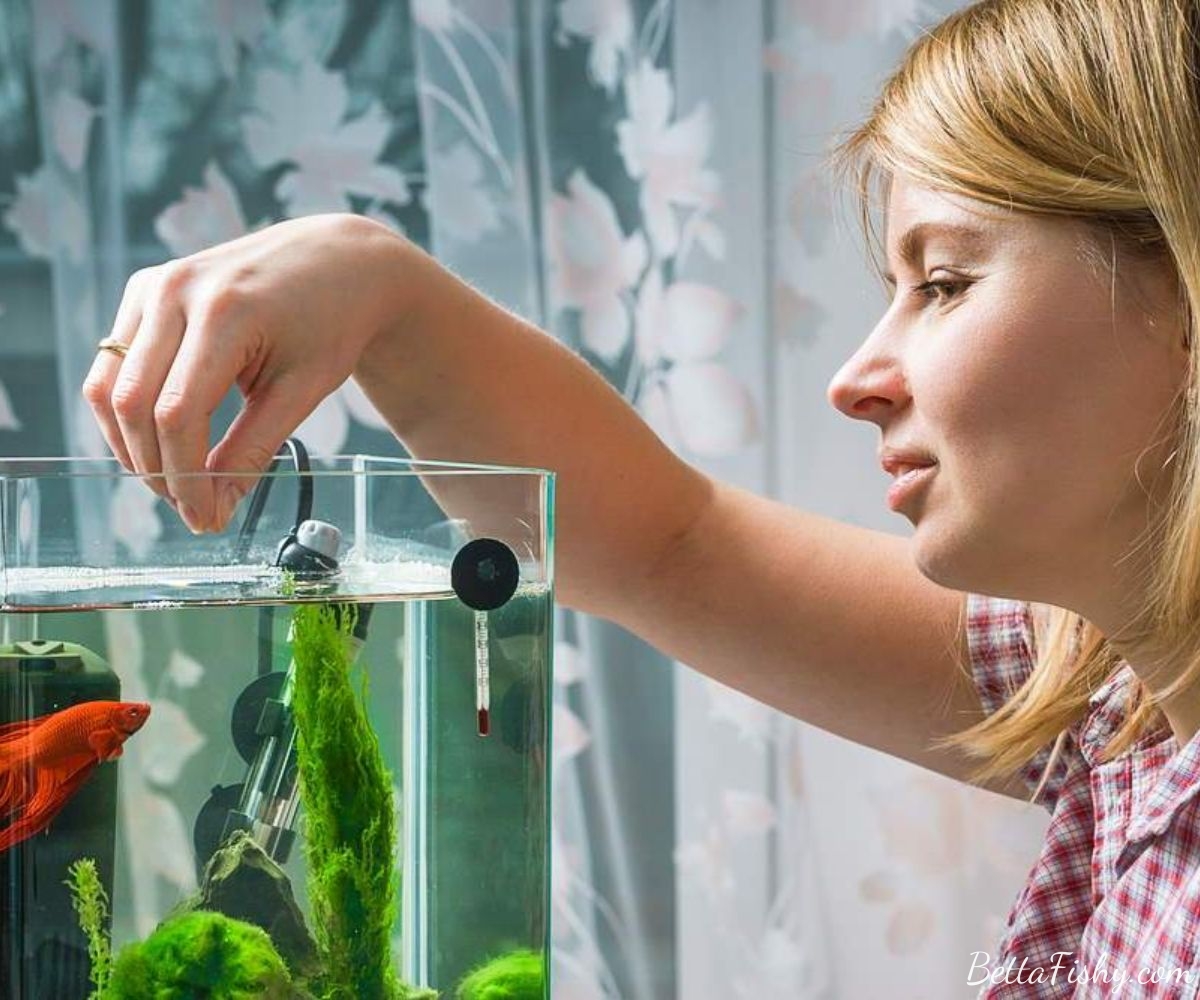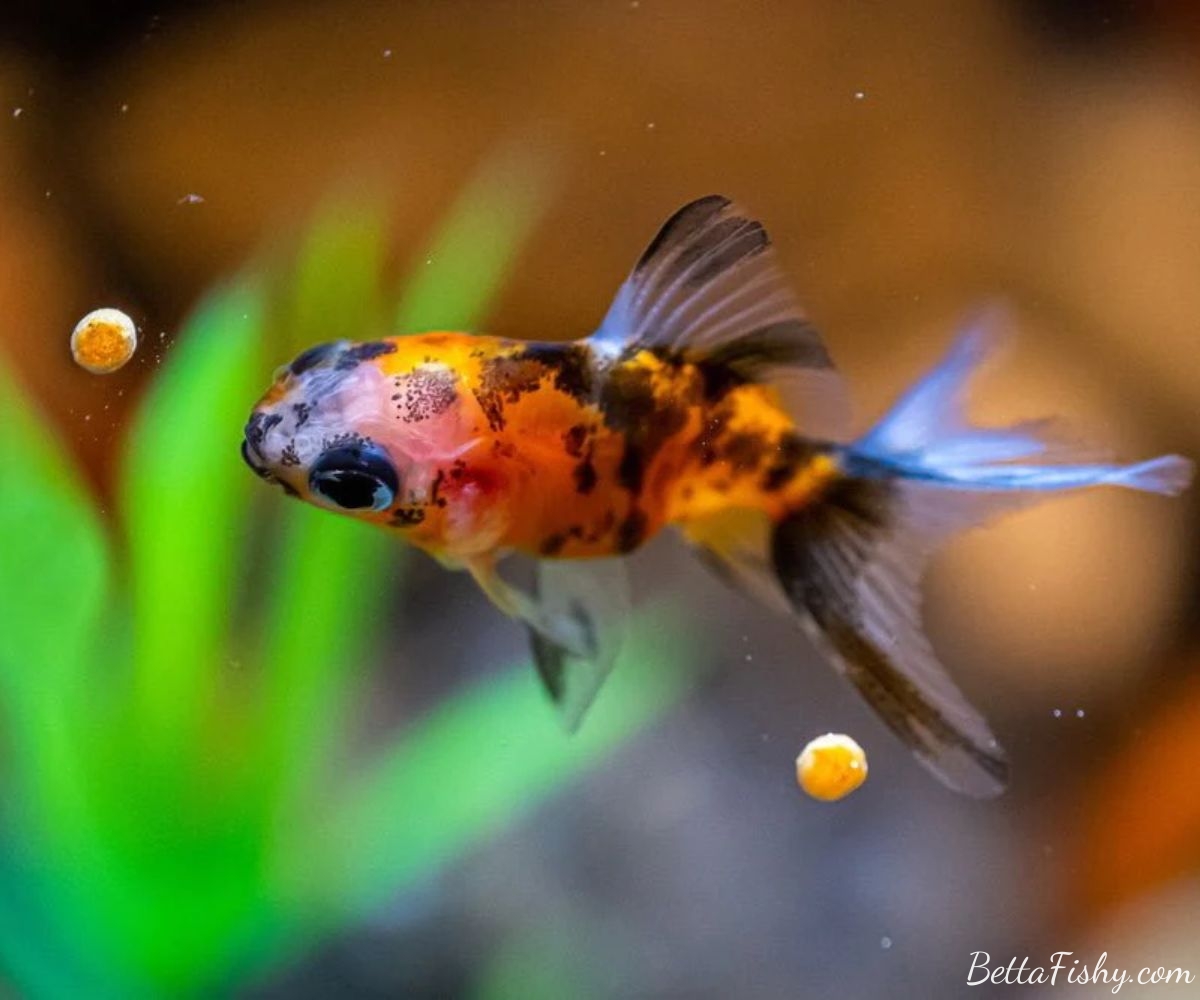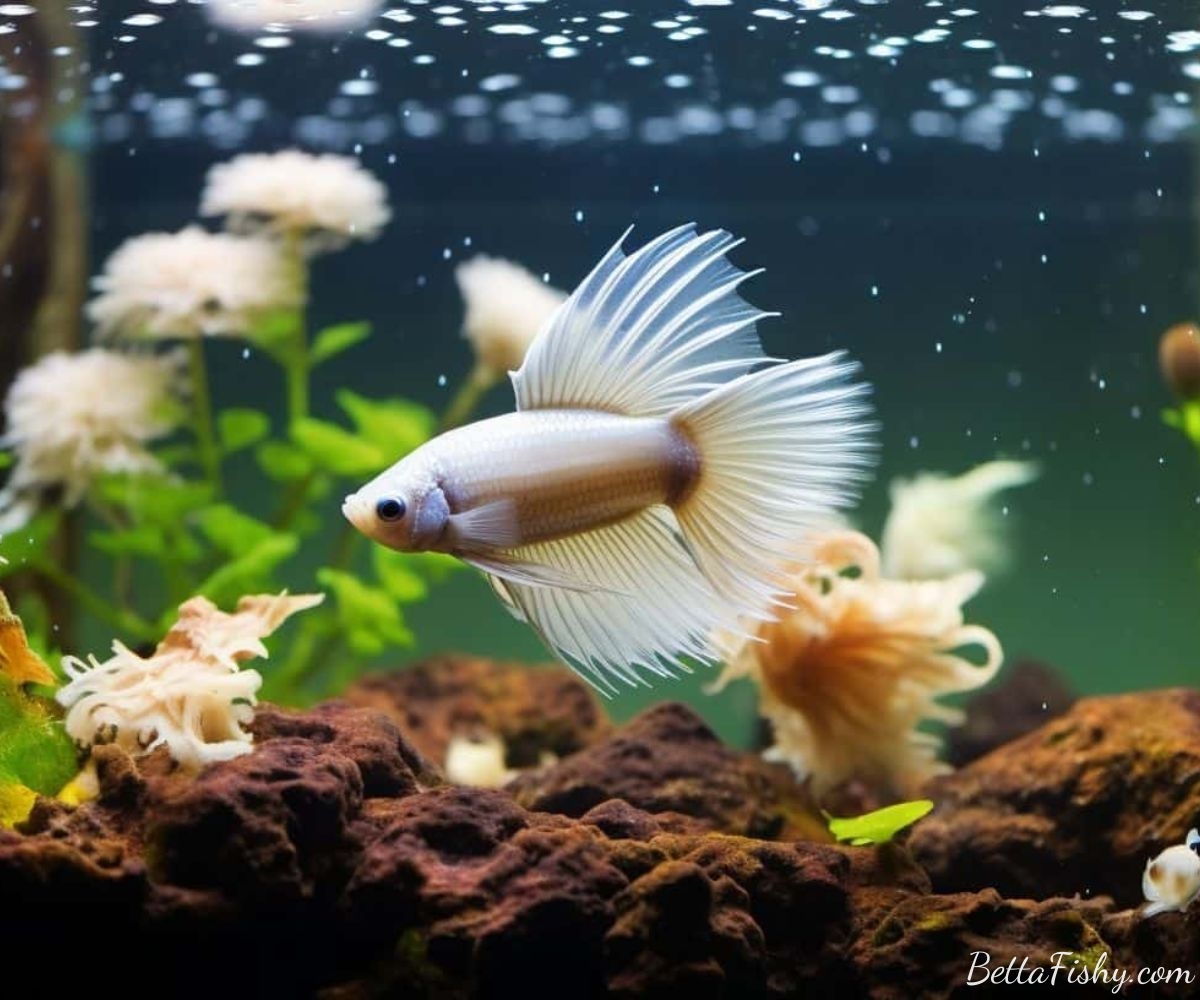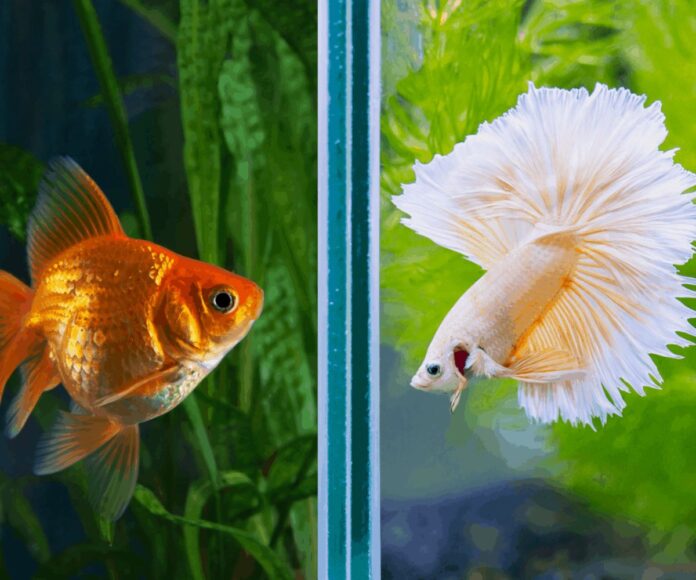Introduction
Can a Betta fish eat Goldfish food? This is a frequently asked question. There is often confusion among aquarium owners over whether betta fish can safely eat goldfish food. On the surface, it seems reasonable that bettas could subsist on goldfish flakes or pellets. After all, they are both fish. However, there are important dietary differences between the two species that impact whether goldfish food provides proper nutrition for bettas.
This article will provide a definitive, research-backed answer on whether bettas can eat goldfish food. BettaFishy will analyze the specific nutritional requirements of bettas, compare them to goldfish needs, look at health impacts of feeding goldfish food long-term, and summarize best practices for betta nutrition. The goal is to equip betta owners with facts so they can make informed choices about diet.
Betta Fish Dietary Needs

As carnivorous fish, bettas require a high protein diet to stay healthy and active. In the wild, bettas eat mostly insects, insect larvae, and zooplankton. Since bettas are obligate carnivores, animal-based protein should make up 50% or more of their diet. Foods like bloodworms, brine shrimp, and daphnia provide bettas their ideal nutrition profile.
When keeping bettas as pets, the most convenient way to meet their dietary protein requirements is by feeding a high quality betta pellet or flake food. These formulated betta foods contain fish meal, shrimp meal, whole fish and other ingredients to mimic the betta’s natural carnivorous diet. They are typically made with around 40-50% protein content along with necessary fat, fiber, vitamins and minerals. This complete and balanced formula ensures domestic bettas get the nutrition they need when live foods are not available.
Goldfish Dietary Needs

Goldfish are omnivorous fish with a diverse diet consisting of both plant and animal material. Unlike strict carnivores like betta fish, goldfish thrive on a varied combination of meaty and plant-based foods. Goldfish are not picky eaters and will eat both flakes and pellets, as well as live and frozen foods.
Most goldfish foods and pellets contain a high amount of plant-based ingredients like wheat germ, vegetables, and spirulina. These ingredients provide carbohydrates, fiber, and vitamins. However, goldfish also need protein, so quality goldfish diets will contain around 25-35% protein from ingredients like fish meal, shrimp, and bloodworms. A diverse blend of plant and animal ingredients makes for a nutritionally balanced goldfish diet.
When feeding goldfish, it’s important to choose a complete food formulated specifically for goldfish rather than less nutritious generic fish foods. Look for goldfish pellets and flakes with multiple protein sources as well as wheat germ, vegetables, and supplements to meet their omnivorous nutritional needs.
Key Nutritional Differences
There are some key differences between the nutritional needs of betta fish versus goldfish that make goldfish food unsuitable as a primary diet for bettas long-term.
Goldfish foods are designed to contain high levels of vegetable matter and fiber, along with some protein from ingredients like fish meal. The primary ingredients tend to be plant-based, such as wheat germ, spirulina, and various vegetables. This omnivorous formulation is well-suited to a goldfish’s natural diet.
Bettas, however, are carnivores that require high levels of protein in their diet from meat and insect sources. Bettas thrive on foods like brine shrimp, bloodworms, daphnia, and insect larvae in the wild. Goldfish foods simply don’t provide enough protein from these animal sources to properly nourish a betta.
The lack of sufficient protein can lead to malnutrition in bettas over time. Bettas fed a predominantly goldfish diet may become lethargic, lose their color vibrancy, and become susceptible to disease due to the impacts of protein deficiency.
Additionally, the vegetable-based fillers like wheat germ that make up the bulk of goldfish foods can be difficult for bettas to digest properly. Bettas lack the specialized omnivorous digestive system that goldfish possess. The excess fiber in goldfish pellets and flakes can potentially cause constipation issues in bettas.
Betta Fish Alert! Why Feeding Them Goldfish Food Could Be Risky Business
There are several health risks that can arise from feeding betta fish a diet primarily consisting of goldfish food. The fillers like wheat germ that are common in goldfish flakes and pellets can cause constipation and digestive issues in bettas. Bettas are carnivores not well-equipped to process large amounts of plant-based ingredients.
The lack of protein and meat ingredients in goldfish foods can also lead to malnutrition in bettas. This can cause lethargy, loss of vibrancy in their colors, and a weakened immune system. Bettas require high protein foods to thrive.
If a betta fish is fed a goldfish diet long-term and does not receive proper nutrition, the health consequences could become severe or even life-threatening over time. The dietary deficiencies can compound quickly. Goldfish food should never be used as the sole nutrition for bettas.
Goldfish Food Might Work Short-Term for Betta Fish
While a goldfish diet should not be used long-term for bettas, there are some emergency situations where betta flakes or pellets can be fed in the short-term:
In an emergency when no other food is available: If you’ve run out of your betta’s normal food and the only thing available is goldfish flakes or pellets, it is okay to feed a small amount to your betta for a day or two until you can get proper betta food. This is a better alternative than letting them go hungry. However, it should only be done in true emergencies.
Goldfish food can work for bettas for a couple feedings but is “not a balanced diet for the ornamental fish.”
Must supplement with high protein foods: When using goldfish food as an emergency betta food, it is critical to also supplement with high protein foods like brine shrimp or bloodworms. The lack of protein in goldfish flakes/pellets can lead to malnutrition in bettas over time. Adding protein-rich foods will help compensate.
Goldfish food is often plant-based and low in protein, so supplementing with meaty foods is important.
Transition back to proper betta diet: After using goldfish food for an emergency, betta owners should transition their fish back to a proper betta diet with high quality betta pellets as soon as possible. Continued use of goldfish flakes/pellets can be detrimental to their health.
Bettas and goldfish have very different dietary needs, so goldfish food should only be a very temporary solution.
The Feeding Guide For Bettas

When it comes to feeding betta fish, the best practice is to use high quality betta pellets as their staple food. Betta pellets are specially formulated to meet the nutritional requirements of bettas. They have high protein content with meat or fish meal as the first ingredient. Top betta pellet brands to look for include Omega One Betta Buffet Pellets, Hikari Bio-Gold, and New Life Spectrum Betta Formula.
In addition to pellets, bettas benefit from being supplemented 2-3 times a week with treats like bloodworms or brine shrimp. These meaty freeze-dried or frozen foods provide enrichment and variety. They also contain protein and nutrients that pellets may lack. Just be careful not to overfeed treats, as they can cause bloating if given in excess.
It’s important to avoid using goldfish flakes or pellets as the primary nutrition for bettas. As discussed earlier, goldfish foods are plant-based and too low in protein. They lack the proper nutrition balance bettas need to stay healthy long-term. At most, goldfish food can be given very sparingly as an emergency backup if you run out of regular betta food.
Summary
To summarize, betta fish have specific dietary requirements as carnivorous fish that differ from omnivorous goldfish. Bettas need foods high in meat and protein, while goldfish foods contain plant-based fillers and little protein. Feeding goldfish flakes and pellets to bettas can lead to malnutrition and serious health issues due to the lack of protein and improper nutrition. While goldfish food may work in an emergency for a short period, it’s critical to transition bettas back to a proper high protein diet as soon as possible for their health.
The best practice is to feed bettas a quality pellet or flake food designed specifically for them, and supplement with frozen and live treats. Avoid making goldfish food the staple for bettas, as the nutrition mismatch can compromise their health over time. Giving bettas proper nutrition tailored to their needs as carnivores is key to keeping them vibrant and healthy.
Conclusion
While betta fish can physically eat goldfish food, it does not provide the proper nutrition and protein they need to thrive. A diet primarily of goldfish flakes or pellets will lead to malnutrition, digestives issues, lethargy, and other health problems in bettas. Though goldfish food can serve as an emergency short-term food, it should never make up the staple diet.
For good health and longevity, bettas require foods tailored specifically to their needs as carnivores – quality pellets and treats with high protein ingredients like fish, shrimp, and insects. Though it requires more specialized care, a proper betta diet is vital and will reward owners with a more active, vibrant fish.We hope this article will be useful to you and solve your question:”Can a Betta Fish Eat Goldfish Food?”


